- Home
- M. K. Hume
The Poisoned Throne: Tintagel Book II Page 4
The Poisoned Throne: Tintagel Book II Read online
Page 4
‘You’ve always been the perfect wife,’ Aeron responded and nuzzled his wife’s neck as she cross-checked the household accounts. He considered himself to be a fortunate man, for his wife was not only literate and numerate, but accomplished in many other areas as well. A pleasant companion and loving bedfellow, she had borne him five children who were growing like weeds, living proof of God’s favour.
‘I believe that Severa will prove to be a dutiful and doting wife, if she is fortunate enough to marry a man who is kind and prepared to overlook her unfortunate birth. But she could become the tool of an ambitious man who would use her to further his own plans. Even the crown of the Western Empire could become a part of her dowry if the right political conditions existed. We can only hope that God will stand at her side and protect her.’
Aeron crossed himself quickly, for he had seen for himself what hubris and rampant ambition could do to usually civilised and sensible men. He shuddered at the memory of loyal servants who went to their deaths rather than leave their masters to ignominy and execution. He could still see the face of Andragathius, the captain of Maximus’s Horse and his most loyal servant, who obeyed his master’s instructions and led Aeron to safety. Andragathius’s need for revenge on his Roman enemies was such that any delay in resuming the battle was like a knife in his side; he and his remaining companions had ridden away joyously at the prospect of making an insane, suicidal attack against their Roman masters.
Both Aeron and his queen sighed for the past and the loved ones who would never return.
‘Perhaps you should let the council of kings know that you have decided that Severa should be wed. When do they meet again? I know the council has been inactive for some years, but the current Pictish invasion in the north could be a good reason to call a meeting in the near future. I believe the Roman centuries have dug the enemy out of their rat-holes along the east coast, but I heard old Huw talking about the Picts and how they’ve lodged themselves into the mountain spine of northern Britannia, just like ticks in an old man’s blanket.’
‘I thought you didn’t listen to gossip, woman?’ Aeron quipped. ‘Didn’t you punish Orla and Pridenow for that very same sin?’
‘Aye! But I don’t pretend to be perfect! Besides, old Huw served my father for many years and he’s forgotten more about the northern savages than most of our kings will ever learn. Besides, the old man is right, isn’t he?’
Her husband nodded glumly.
‘I’ve been told that the Picts have set up an encampment to the north of Eburacum, so they seem to have settled in for the winter. This is a new strategy on their part and it could bode ill for our forces in the north. When the legions were stationed in the garrison at Eburacum, such arrogance would never have been permitted. But, since the Roman command abandoned the fortress, the Picts have been permitted unrestricted entry to the northern lands of Britannia. The population there is unprotected. Small parties of raiders are collecting food, gold and slaves to take north, so we believe the spring attacks will be earlier than normal. The fighting will be vicious and might penetrate further into the south than their usual efforts. Even now, what’s left of the legions is wasting Roman blood in a vain attempt to isolate some of the barbarian war parties. God help them! There has been some talk of reinforcements returning from Gallia, but I fear that the emperor, Honorius, is ready to cede Britannia, Gallia, Hispania and Northern Africa to the barbarians, rather than throw away good Roman gold on what he sees as lost causes.’
Endellion paled. A world without their Roman overlords was hard to imagine. The legions had protected this fertile island from the northern savages for more than four hundred years. The British people had given up their autonomy when the first Roman sandals had stood on the pebbled beaches of Dubris, but the Romans had brought civilisation, trade and wealth with them, so that no Britons alive could remember a time when their people were slaves fated to live out their days in ignorance and filth.
‘We face an uncertain future if we can’t depend on the protection of the Roman legions. My father accepted that the sheer number of raiders in our lands would ultimately allow them to rule over the British people. Although he hated the thought, he believed that the Saxon barbarians would ultimately prevail, and these new masters would be far less hospitable than the Romans.’
‘We’ll have little control over the disasters that will befall us, wife, so I’m reluctant to fear what I can’t change.’ He pulled up her chin so he could stare into her troubled eyes. ‘It’s time to put your labours to one side, Endellion, and come to bed.’
His wife resisted him momentarily as she imagined a war-torn world that her children might be forced to endure. But Aeron, familiar with her introspective fits, gripped her hand and turned her face up to his with his other palm.
‘Smile for me, sweet Endellion, and we shall make our way to rest. I’ve lived long enough to know that the wisest men snatch their pleasures while they can. Perhaps your sweet flesh will ease my troubles . . . and, perhaps, an old man can do the same for you.’
Despite herself, Aeron’s mock-lasciviousness triggered a giggle from Endellion. She eyed him quizzically.
‘We’re an old married couple, not passionate young lovers, my lord,’ she said seriously. But then she spoiled the whole effect by giggling again.
‘Perhaps I should take you into the stables. The hay is soft and sweet in the storage loft, so I could show you how a man should treat a heartless and teasing wench.’
‘You wouldn’t dare, you fool,’ Endellion retorted, and then drew in her breath as her husband squeezed her sensitive nipple with one familiar hand.
Aeron knew by her flaring eyes that her lust matched his.
‘No, Aeron! We have a perfectly good bed along the corridor . . .’ Endellion’s voice faded away as Aeron swung her over his shoulder with a mocking groan of feigned pain. ‘I’m far too heavy, my love,’ she protested.
‘Come on, wench! I refuse to waste a harvest moon worrying about verminous Picts or heathen Saxons. Have I ever told you that I married the most wilful, carnal and imaginative woman in all of Britannia?’
‘How dare you accuse me of carnality? You’ve taught me everything I know!’
And then the respectable, middle-aged rulers hurried into the stables. The guardsmen watched their giggling progress with knowing complacency, for the ways of the aristocracy were very strange. Why would the king choose to pleasure himself with the queen in the straw?
‘I wouldn’t care to leave a comfortable bed to sleep in the stables,’ one of the younger guardsmen said emphatically. ‘I sometimes wonder if the Great Ones have sex in the same way as we lesser men.’
‘You daft pillock! How many ways can men and women pleasure each other?’ his friend replied with a friendly cuff to the side of the head.
Both of these watchful guards knew that the world of Corinium was safe and well under such benevolent and carefree rulers. Meanwhile, in the straw of the stables, Endellion could see a square of stars, as brilliant as shards of glass, through an opening in the loft. She wondered if God lived in one of those shivering stars and then, as her husband’s body became more demanding, she thought of nothing sensible at all.
CHAPTER II
A Meeting in Deva
The unbelieving husband is sanctified by the wife.
Corinthians, 7:14
Winter passed slowly as the population of the south shuddered and shivered through the throes of war, periodic flurries of violence reflecting the ongoing campaign in the even colder north. This was a strange experience for the people of Britannia, because conflict during this dark and inhospitable season was a rare experience. These Pict invaders must have planned their raids over a long period of time if they were prepared to winter inside hostile terrain surrounded by enemies. Accustomed to the freezing cold to the north of the Wall, the Picts had caught the Britons and
Romans completely off guard.
The Romans dug their way into the mountain ranges of Britannia as they searched for remnants of the original Pict army that had disappeared into the landscape. The three centuries of legionnaires under the command of Constantinus had proved successful against one large group of hostiles who occupied Navio, a deserted fort abandoned by its Roman occupiers in bygone days and allowed to deteriorate. Other deserted Roman camps from yesteryear had offered some protection to isolated cadres of the enemy, so the entire winter had been taken up with the dangerous and tedious task of weeding out and crushing them.
As the Pict warrior force spread throughout the northern parts of Britannia, the British kings found that they were reliant on the last remnants of the Roman legions to defend them. Throughout the winter and the unseasonably wet spring that followed, the Roman forces had been thinly stretched on the ground as they struggled to keep the groups of Pictish fighters from coalescing into a large and efficient army.
But Constantinus and his force of legionnaires and native auxiliaries had weakened the backbone of the invading Picts. His fierce and uncompromising pursuit of the infiltrating warriors had been the deciding factor in a series of battles fought mostly on the run. Then, by denying the invaders an opportunity to regroup, the centurion had pursued them until they were run to ground.
Then, through a combination of luck and good strategy, Constantinus had managed to decimate them.
The Pictish strategy had been risky at best, for finding suitable places to hide for the winter, not to mention their difficulties with supply lines, had been a calculated risk for the Pictish commanders who had decided to remain isolated from their comrades. They had taken the precaution of sending advance parties into the north-east during the preceding twelve months, with the specific purpose of secreting caches of food and weapons in isolated caverns and hidden encampments but, even so, the northern warriors had been forced to carry some grain with them and live off the land whenever the opportunity occurred. It had proved to be a cold and miserable winter for Picts and Britons alike. Famine had gripped the land and hunger hollowed the bellies of the combatants, as the local farmers lost their stores of winter grain to warriors on both sides.
At the same time, the Roman Eagles had no intention of leaving Britannia under the cloud of a military defeat. Despite the moderate size of their force in the disputed area, the young men who served under Constantinus in this arse-end of the Western Empire were eager to prove that they were worthy of promotion and transfer to softer, more profitable commands. Every legionnaire in the Roman army was aware that the empire was contracting back into the Sacred City of the Seven Hills, so they contrived to achieve maximum profit from the retreat.
Spring died and the heat of summer baked the fens and the swamps under steel-blue skies by the time the Picts were finally defeated outside Eburacum. The rivers ran red and the citizens of that august city believed at first that their troops had failed. The Picts had thrown themselves against the Roman troops and their native auxiliaries with the desperation of homesick men who were hungry to return to their kinfolk in the stark mountains of the north.
Finally, defeat became inevitable when the Picts made the strange decision to attack the Romano-Britannic army frontally, a strategy that was bound to bring out the best tactical defences of the legionnaires. In tried and true fashion, Tribune Maximo and his Roman troops stood their ground in the centre of the field, while their light native cavalry was used to smash and harry the Pictish survivors before they could escape.
Word had come quickly to Corinium.
As the sun began to descend into the afternoon sky, a small troop of British cavalry rode southward along the wide Roman road that connected Corinium and Ratae. The weary riders were covered with a thick coating of white dust from the many miles they had travelled. The commander of the Dumnonii column was Ynyr, son of Cadoc of Tintagel, Endellion’s brother. When her nephew was ushered into Endellion’s presence, Ynyr threw himself negligently on to a stool and drank the proffered mug of beer, after kissing his aunt soundly and tossing Pridenow into the air like a cloth toy.
‘I had hoped you and the children would be here and not seeking relief from the heat beside the sea, Aunt Endellion. I fear that my men are near to done and, although it’s only a small push to reach our homes, I doubt that the horses can last without a long rest to recover their strength. We’ve been away for almost six months on this campaign.’
Endellion ruffled her nephew’s hair with affection. ‘You’ve been absent for far too long, young man, so rest a while. A week in Corinium will make little difference to those who wait for news of your return, so we’ll send a courier to keep them informed. There’s no need to put exhausted men and animals at risk, and my husband will want to speak with you when he returns from his mission to Ratae.’
‘So Aeron is representing our interests with the kings of Cymru and the tribes of the north? Good! Those of us who live in the south-west are often forgotten and unrepresented. My father will be pleased that Aeron has decided to attend their discussions. Was he specifically invited?’
Ynyr’s expression was as cynical as ever, so Endellion was certain that Cadoc had been displeased with the undue influence of the Cymru tribes on past decisions affecting future security. The shores of Aeron’s kingdom were well protected and his tribal villages and towns were shielded by the great ranges of mountains to the east, so the Dobunni tribe was less vulnerable than the Atrebates and Cornovii, populations whose survival depended on the protection of their Roman masters.
‘No! My lord wasn’t invited, which would have come as no surprise to your father, but Aeron had already journeyed to Venta Silurum where his younger brother rules. He received sketchy details of the meeting from his brother and, as he had been eager to attend such a gathering for some time, he chose to travel to Ratae and force his way into the meeting of the council. He was certain that none of the other kings would object to his presence. I hope his endeavours were successful.’
Ynyr gazed suspiciously at his aunt. ‘Why?’
Endellion was acutely aware that her father’s male kin had little guile in their natures, so they could be bluntly spoken at times when diplomacy was needed. But she also knew that plain speaking could be a virtue.
She nodded in the direction of Severa, who was playing with the queen’s youngest daughter, an infant not yet twelve months old. Ynyr’s face lightened immediately.
‘Was King Aeron in Corinium for the birth of your youngest child, Aunt Endellion?’
‘No!’ She shook her head regretfully. ‘He had planned to return to me, but word then came of the meeting at Ratae as soon as the Picts were put to the sword. He waited and waited, but my time of confinement couldn’t be delayed for any political outcome. And you?’
Something in her nephew’s face suggested to Endellion that Ynyr’s new wife might have been pregnant when he departed on this last campaign.
‘Aye! A courier reached me outside of Eburacum. I have been told that I have a son, a boy-child who will be named Gorlois after one of my kinsmen who lives in Armorica. I will meet the babe when I return to Tintagel. I must admit to some anxiety because I was absent at a time when I should have presented my son and heir to my people. I should have had the opportunity to hang his birth gift around his neck and give thanks at the Chapel of the Sacred Springs for God’s gift of a boy who will one day become a king. Instead, I was far away, securing the safety and wealth of other kings, as well as the security of their heirs and their acres. Sadly, too many of our young people have perished in recent times, and our tribes can ill afford the loss of their best warriors.’
‘I’m afraid that destiny is cruel and uncaring.’ Endellion’s voice was laced with bitterness. ‘We are required to relinquish almost everything we love for the sake of our lands and our people. Your grandfather, Caradoc, gave everything willingly, but I have a
lways resented some of Fortuna’s demands. What of you, Ynyr?’
The young man nodded, but he refused to answer. Clever as she undoubtedly was, Endellion couldn’t fully understand complex matters such as duty and the exigencies of rule. Like it or not, she was only a woman.
Unaware of his thoughts, Endellion tried to lift the spirits of her young nephew, whose face was far older and more careworn than the features of any twenty year old should have been.
‘Britannia demands that we pay a high price for our freedom,’ she mused. ‘When did our lives begin to go so wrong?’
Although Severa was the subject of the thoughts of both Endellion and Ynyr, she scarcely noticed their concerns. Nor did she realise that she was the cause of some discussion at the conference of the British kings in Ratae, the armed Roman camp that sat at a critical junction of the well-maintained arterial roads servicing the northern outposts of Britannia. As the discussion flowed to and fro, the British rulers were forced to recall their experiences at the hands of Flavius Magnus Maximus, the assassinated High King of Britannia and ruler of the Western Roman Empire. Many of the kings remembered that Maximus had bequeathed something of inestimable value to them in the form of an unmarried daughter through whom a claim to the title of High King could be made. The more acquisitive and ruthless among them had already realised that she could be the means of achieving the ultimate reward, the laurel wreath of Rome.
‘Remember,’ Aeron shouted over their bleats and howls, ‘there are some matters that must be taken into account before you make fools of yourselves and press your own claims. The tribes must arrive at a unanimous agreement, if you are determined to anoint a High King. Unanimous! Nor could one of you steal Severa and hope to foist her off on us, pregnant from rape. Such perfidy would be treated with the contempt that such vileness would deserve by me and by those rulers who are of high moral fibre. My wife raised Severa and she would never permit this girl to be abased for political ambitions.’

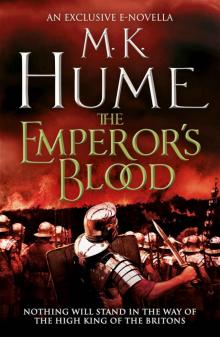 The Emperor's Blood (e-novella)
The Emperor's Blood (e-novella)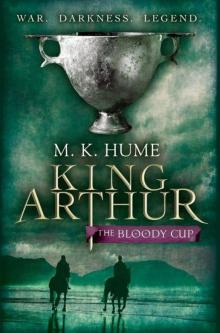 King Arthur: The Bloody Cup: Book Three
King Arthur: The Bloody Cup: Book Three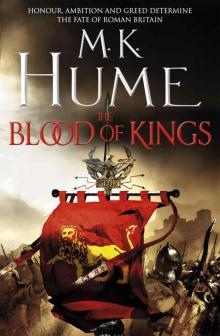 The Blood of Kings: Tintagel Book I
The Blood of Kings: Tintagel Book I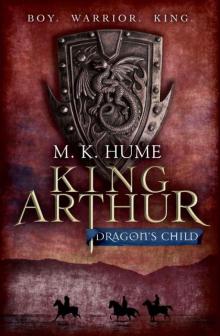 King Arthur: Dragon's Child: Book One (King Arthur Trilogy 1)
King Arthur: Dragon's Child: Book One (King Arthur Trilogy 1)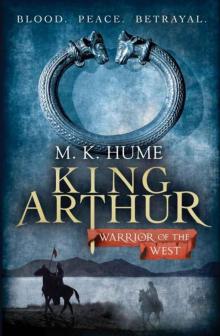 King Arthur: Warrior of the West: Book Two
King Arthur: Warrior of the West: Book Two The Storm Lord
The Storm Lord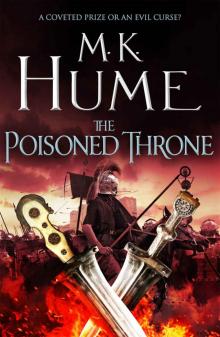 The Poisoned Throne: Tintagel Book II
The Poisoned Throne: Tintagel Book II![M. K. Hume [King Arthur Trilogy 04] The Last Dragon Read online](http://i1.bookreadfree.com/i2/04/07/m_k_hume_king_arthur_trilogy_04_the_last_dragon_preview.jpg) M. K. Hume [King Arthur Trilogy 04] The Last Dragon
M. K. Hume [King Arthur Trilogy 04] The Last Dragon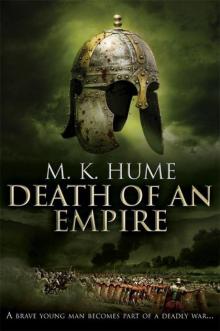 Prophecy: Death of an Empire: Book Two (Prophecy Trilogy)
Prophecy: Death of an Empire: Book Two (Prophecy Trilogy) Prophecy: Web of Deceit (Prophecy 3)
Prophecy: Web of Deceit (Prophecy 3)